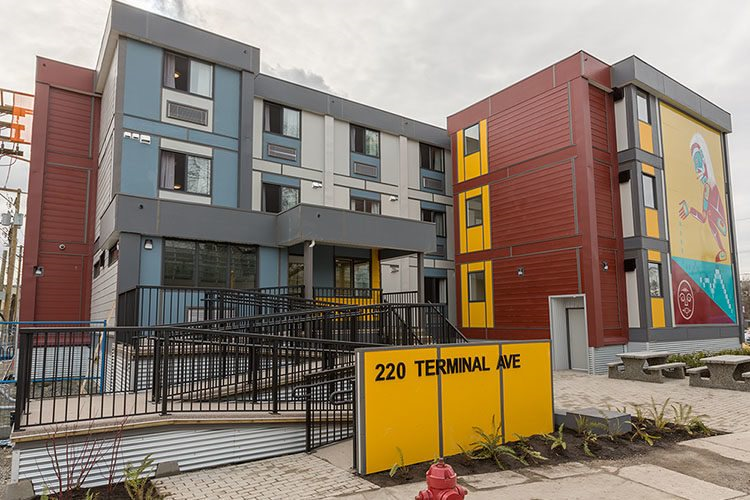| Fonds Accès Coop Proprio (FCAP) Confédération québécoise des coopératives d’habitation CQHC |
Units are offered and managed under a co-operative tenure providing affordable housing while allowing members to earn equity. The innovation is focused on the fact that affordability will be maintained over time, to support intergenerational equity. |
Incremental Financing Model |
Quebec |
| Illu Tigguaralik Green-Plex |
In partnership with the National Research Council, a series of advanced building technologies specific to northern climates were tested and implemented for the first time in residential buildings |
Transformational Building Model |
Nunavut |
| Vancouver Affordable Housing Agency (VAHA) |
First movable modular project developed in Canada that demonstrated the technical viability of modular housing, but also tested new approaches to finance the construction of modular housing. This project is also responsible for greater understanding of the financing and viability of modular housing throughout the affordable housing sector. |
Transformational Building Model |
British Columbia |
| Whistler Housing Association Passive House |
Using a prefabricated assembly system, Whistler Housing Authority demonstrated that housing built to achieve Passive House standards could be built at similar costs to code-built housing. At the time of this project, it was still widely believed that all passive housing was prohibitively expensive to construct. |
Breakthrough Building Model |
British Columbia |
| VanCity Community Foundation & Greater Vancouver Community Assistance Foundation |
This project tested the market’s perception that the early construction stages were exceptionally risky by providing pre-development and pre-construction financing at low interest rates, typically the most difficult and expensive part of construction financing. Allows non-profit and social housing providers that would typically have to be subject to higher interest rates due to the perceived pre-development risks and limited track records or assets to be used as security. |
Breakthrough Financing Model |
National |
| United Church of Canada |
The establishment of an organization by United Church of Canada (UCC) to develop its over 3,000-site real estate portfolio leveraging the innovative in scale, size, scope, and complexity. Notably, the use of a portfolio approach allowed the UCC to leverage idle assets for development of sites that were previously unconnected, developing both new and converting existing buildings to create affordable housing. |
Transformational Financing Model |
National |
| Kanas |
While most building projects that are pursuing high levels of energy efficiency while minimizing energy use utilize higher insulation levels or improvements to the building envelope, Kanas focused on testing how green energy sources combined with storage could minimize reliance on traditional energy sources. Tenants were also provided real-time data to monitor, and possibly reduce or minimize, their energy consumption. |
Incremental Building Model |
Alberta |
| Alberta Rural Development Network |
Creation of a framework which would leverage a portfolio of projects to achieve economies of scale to build net zero housing with shipping container housing at a similar cost as non-net zero housing units. |
Breakthrough Building Model |
Alberta and Ontario |
| Ken Soble Towers |
The project sought to leverage new technologies and approaches to demonstrate cost savings associated with the retrofitting of high-rise multi units when compared to the new build of a multiunit passive building. Work focused on a high-rise building that was constructed in the 1940’s. Project has provided significant lessons learned for future retrofit projects that will move the industry forward in this ambition. |
Breakthrough Building Model |
Ontario |
| Toronto’s Modular Housing Pathway |
Modelled off the VAHA model, the Toronto approach demonstrated scalability and a novel approach to delivering housing. Leveraging the ability of the city to quickly provide zoning, the city will move units to where homeless residents reside (e.g., tent cities) to provide rapid housing as opposed to dislocating individuals from the current support networks they have. |
Incremental Building Model |
Ontario |
| LogisNov |
Development of cost-effective modular housing approach and design that would lower the cost and increasing scalability relative to conventional modular housing. |
Incremental Building Model |
Quebec |
| Capital Regional District CRD |
Model brought together actors from all levels of government (Municipal, Provincial and Federal) along with housing sector proponents to facilitate and adopt a mixed-use approach to address homelessness. This approach helped to reduce the barriers typically found in developing affordable housing that often requires developers to seek multiple sources of funding and increases the risk of funding being pulled due to the timelines involved. |
Incremental Financing Model |
British Columbia |
| UTILE |
The financial innovation was demonstrated by how UTILE took the capital to market and attract various investments sources The investments facilitated the creation of Fonds d’investissement pour le logement étudiant (FILE), which in turn created an investment fund that would guarantee the construction of affordable student housing in the city. |
Breakthrough Financing Model |
Quebec |
| SÉDAC |
The project was innovative due to its use of on-reserve funds which did not require a Ministerial Loan Guarantee. Additionally, the program is expected to demonstrate that it is possible to leverage debt markets to finance on-reserve housing when it expands its portfolio to an adequate size that it can potentially issue a bond. |
Incremental Financing Model |
Quebec |
| Isthmus Capital Reconciliation Income Fund |
Isthmus leverages the flexibility of the Innovation Fund via a revolving fund to facilitate the development of relationships that bridged private developers, investors, municipalities, and Indigenous groups to unlock the value of land parcels for the achievement of housing development. Its nuanced approach was able to overcome a long history of obstacles preventing such partnerships from being successful. |
Breakthrough Financing Model |
National |
| Homes for Heroes — Rapid Village |
The project sought to show that changes in process and technology use could be leveraged to realize a very quick development cycle for rapid delivery. As an added benefit, project also leveraged research to incorporate therapeutic and mental-health oriented design features such as having units that are detached but within sight of each other in a closed fashion to provide independence, yet a simultaneous community feel. |
Incremental Building Model |
Alberta |
| Nisichawayasihk Cree Pewapun Construction |
The project was able to demonstrate success in multiple unique building techniques with a northern focus including new approaches to reducing mold. |
Incremental Building Model |
Manitoba |
| Indwell — Passive House Development Portfolio |
The use of a portfolio approach was innovative in scale and scope within the field of passive housing, allowing Indwell to leverage the scale of work to reduce costs associated with construction. |
Incremental Building Model |
Ontario |
| Windmill Dream ZIBI Master Community — District Energy System |
This is the first post-industrial waste heat recovery system in North America and takes advantage of the heat energy of the water that would have otherwise been wasted. The project has fully redundant natural gas boilers for operational contingency. Tenants will be shielded against future increases in energy prices, providing for greater certainty of future housing costs. |
Breakthrough Building Model |
Ontario Quebec |
| CentreVenture Development |
The project innovation comes from the application of material, design and process approaches needed to build the first high-rise construction of net zero in Canada, applying a Scandinavian-based building model to the Canadian context. |
Breakthrough Building Model |
Manitoba |
| FTQ |
The project was innovative in how it brought together multiple partners (government, institutional, private for-profit) to create access to funding through the creation of a lending syndicate. It is expected that this project will further demonstrate the ability of varying partnerships to assist in development of affordable housing through making funding available for use by smaller and more focused non-profits and community housing sector providers. |
Incremental Financial Model |
Quebec |
 The Affordable Housing Innovation Fund application portal is open for new applications.
The Affordable Housing Innovation Fund application portal is open for new applications.






 Share via Email
Share via Email



